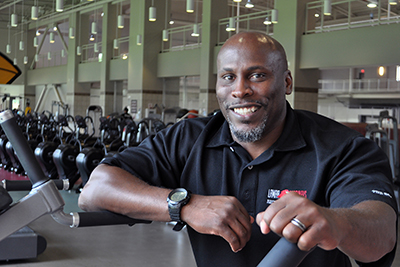Study shows recreational sports boosts retention
 Underrepresented students at the university level experience greater inclusion and higher graduation rates thanks to recreational sports, according to Art Simpson, LU’s director of recreational sports.
Underrepresented students at the university level experience greater inclusion and higher graduation rates thanks to recreational sports, according to Art Simpson, LU’s director of recreational sports.
“Minorities, and young black men in particular, have a low graduation and retention rate. My thought process was, ‘how can we retain students?’” said Simpson.
Simpson says that for many the answer is recreational sports. He has worked with the university’s recreational sports programs since 2002 and explored the idea of athletic programs as an attraction and retention tool—both through his formal education and personal experience with university sports.
“All this time in my position in rec sports—and knowing what rec sports meant to me and how it allowed me to progress and integrate socially—really affected me. I realize how important recreational sports was to my development,” Simpson said.
“It helped make me who I am, and I wanted to be able to give that to the next generation that came in,” he said.
Former president James M. Simmons began an initiative to build LU’s Sheila Umphrey Recreational Sports Center in 2006 as a recruiting tool and a way to increase wellness and fitness. During that period, Simpson contributed his understanding of students’ needs to the center’s design.
Simpson says that the recreational sports center facilitates more than just physical and mental health. For example, randomized sports teams encourage socialization, which affects students’ inclusion and retention. Also, as the largest student employer on campus, the center hires and trains students and imparts skills such as leadership that help them enter the workforce.
“It’s all-inclusive, not just an athletic facility where you come in, lift weights and play basketball. This is a stress release to get your mind off academia and any personal issues you may be dealing with. A lot of students hold on to those things and they need an out,” he said.
Simpson says that after completing his master’s degree in 2011, he realized he wanted to do more to advance in his profession and greater affect inclusion, diversity and outreach. He decided to pursue a doctorate in educational leadership at LU.
“I wanted my own kids to know that they could reach this level, and it also allows me to be a role model for other students at the university that have doubts about whether or not they can make it,” he said.
Drawing inspiration from the needs of his community, he decided to title his thesis “Factors Influencing the Retention and Connectivism of African American Male Students who Participate in Recreational Sports.” The data collection methods included face-to-face interviews in a focus group which allowed the participants to express their own human experiences.
While earning his doctorate, Simpson heard about the Alan Dreeben Grow Your Own Scholarship. The program was established in 2005 by the TSUS Foundation to increase faculty diversity, promote underrepresented populations, support recipients though financial assistance, and provide mentoring models for students within the TSUS system.
Simpson applied and was accepted as the third LU staff member to receive the scholarship. When he earned his doctorate in August 2016, he became the first from LU to complete the program.
Simpson says he was influenced to pursue his doctorate in part by his relatives and his wife Teresa Simpson, special assistant to the dean of the College of Education and Human Development, who earned her doctorate in educational leadership in 2014. Now, he works to give the same encouragement to others who may struggle academically.
“It matters that these young men can reach out to me, talk to me and come here and have a level of comfort. I let it be known that my office is always open, and I help students understand why their education is important,” he said.
Simpson’s education prior to his doctorate includes a bachelor’s degree in Kinesiology from Lamar University and a master’s degree online in recreational sports and tourism from the University of Illinois at Urbana–Champaign.
The Alan Dreeben Grow Your Own Scholarship is funded by the Texas State University System Foundation, Inc., a public nonprofit corporation established by the Board of Regents in 1977 that provides private financial support to the System and its member institutions. The Foundation is governed by an independent board of directors and provides funding for a variety of programs.
The Sheila Umphrey Recreational Sports Center was completed in 2007 thanks to a $5 million donation by Beaumont attorney Walter Umphrey. The 129,550-square-foot center includes a wellness and fitness center, health food café, a cardiovascular room, a walking/jogging track, a 43-foot rock climbing wall, basketball, indoor floor hockey and soccer arena, volleyball, badminton courts, racquetball courts, pool tables, putting green, air hockey, foosball, and more. The Recreational Sports Office organizes and hosts intramural and club sport teams including basketball, volleyball, flag football, indoor soccer, ultimate frisbee, pool, tennis, cricket and badminton.


